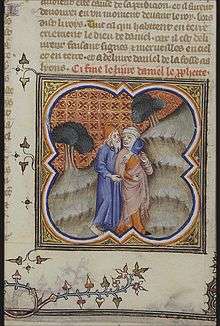Gomer (name)
Gomer was the son of Japheth in the Hebrew Bible.
People with the given name or surname include:
Gomer
Gomer (גֹּמֶר, Standard Hebrew Gómer, Tiberian Hebrew Gōmer, pronounced [ɡoˈmeʁ]) was the eldest son of Japheth (and of the Japhetic line), and father of Ashkenaz, Riphath, and Togarmah, according to the "Table of Nations" in the Hebrew Bible, (Genesis 10).
The eponymous Gomer, "standing for the whole family," as the compilers of the Jewish Encyclopedia expressed it, is also mentioned in Book of Ezekiel 38:6 as the ally of Gog, the chief of the land of Magog.
In Islamic folklore, the Persian historian Muhammad ibn Jarir al-Tabari (c. 915) recounts a Persian tradition that Gomer lived to the age of 1000, noting that this record equalled that of Nimrod, but was unsurpassed by anyone else mentioned in the Torah.
Traditional identifications
Josephus placed Gomer and the "Gomerites" in Anatolian Galatia: "For Gomer founded those whom the Greeks now call Galatians, but were then called Gomerites." Galatia in fact takes its name from the ancient Gauls (Celts) who settled there. However, the later Christian writer Hippolytus of Rome in c. 234 assigned Gomer as the ancestor of the Cappadocians, neighbours of the Galatians.Jerome (c. 390) and Isidore of Seville (c. 600) followed Josephus' identification of Gomer with the Galatians, Gauls and Celts.
Gomer (disambiguation)
Gomer was the son of Japheth in the Hebrew Bible.
Gomer may also refer to:
Places
People
Other uses

Gomer (wife of Hosea)
Gomer (go'-mer) was the wife of the prophet Hosea, mentioned in the Hebrew Bible's Book of Hosea. Hosea 1:2 refers to her alternatively as a "promiscuous woman" (NIV), a "harlot" (NASB), and a "whore" (KJV) but Hosea is told to marry her according to Divine appointment. She is also described as the daughter of Diblaim.
Hosea 1 relates how Hosea has three children, a son called Jezreel, a daughter Lo-Ruhamah and another son Lo-Ammi. All the names are described in the text as having symbolic meaning, reflecting the relationship between God and Israel. Jezreel is named after the valley of that name. Lo-Ruhamah is named to denote the ruined condition of the kingdom of Israel and Lo-Ammi is named in token of God's rejection of his people. Although the latter two children are not specifically said to be Hosea's, James Mays says that this is "hardly an implication" of Gomer's adultery. In 3:1, however, it says that she is "loved by another man and is an adulteress" (NIV). Hosea is told to buy her back, and he does so for 15 shekels and a quantity of barley. Exodus 21:32 establishes the value of a maidservant at 30 shekels so Gomer's value is diminished. She is not mentioned again in the book.
Podcasts:

